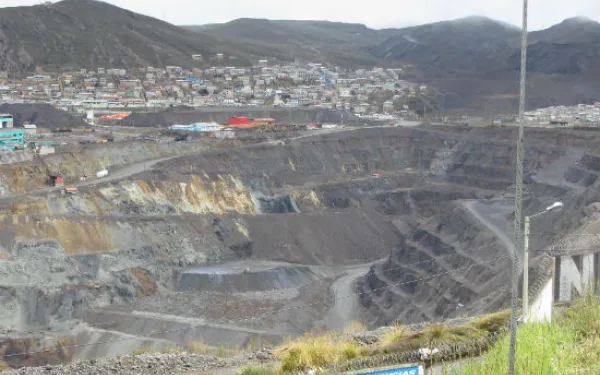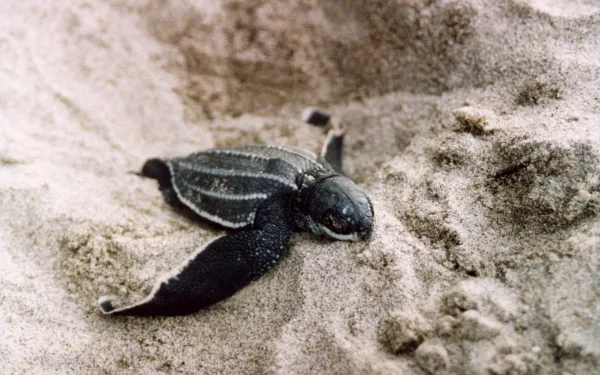
Project
Photo: Ana Rodríguez Carrington (CC BY 2.0)Victory: Biosphere Reserve in Baja California Saved from Toxic Mine
Known as an “ecological treasure house,” the Sierra La Laguna Biosphere Reserve at the southern tip of Baja California will not be spoiled by toxic mine waste, thanks in part to AIDA’s advocacy.
The reserve was once an island, so it’s home to rare plant and animal species. Canyons, swimming holes, and hot springs can be found in its granite mountain range and lowland tropical forests.
Thanks to AIDA and our partners in Mexico, the Mexican government denied an environmental permit for the Paredones Amarillos gold mine, halting the project for the time being. To protect the biosphere reserve, AIDA helped educate community groups and decision makers about the mine's risks. This helped to build the political momentum necessary for the government to deny the permit.
To extract gold from the mountains, the Canadian company Vista Gold proposed to carve out huge quantities of rock—each ton containing a mere gram of gold–-grind it into sludge, and treated it with cyanide. The company planned to dump massive amounts of toxic waste (called “tailings”) behind a dam intended to store it forever. Unfortunately, tailings dams can break for various reasons, as happened at Bolivia’s Porco mine in 1996. When that dam collapsed, more than a quarter million metric tons of tailings flooded the river and contaminated 500 miles (800 km) of waterways in Bolivia, Argentina and Paraguay.
The mine could also cause acid mine drainage. When sulfur-containing rocks are exposed to air and water, sulfuric acid forms, which causes toxic heavy metals to dissolve and drain into the watershed. The risk of acid mine drainage in Sierra La Laguna was significant and the human and environmental cost would have been tremendous: thousands of people and countless wildlife in the reserve rely on its water for survival.
Depleting freshwater is a further threat because mines use tremendous quantities of water. Owing to the scarcity of water in the reserve, Vista Gold proposed to build a plant on the Pacific coast to remove salt from sea water in a highly energy-intensive process, and then pump the water 45 km to the mine site. The desalination plant posed a threat to the endangered leatherback sea turtle.
Singly and together, the mine’s impacts would have devastated a rare jewel, a unique and lush paradise worth saving for future generations.
Related projects

Peru and its socio-environmental conflicts
By María José Veramendi Villa, legal advisor, AIDA, @MaJoVeramendi “In Peru, the general state of social conflict is strongly influenced by the dynamics of economic growth that the country has experienced in recent years; but this growth has not necessarily brought measures that generate a perception of social welfare or political representation for certain sectors of society. ” (Ombudsman’s report No. 156: Violence in social conflict, March 2012) Peru is rich in minerals and other natural resources. Evidence of this is that as of June 2012, 20.3% of the national territory was licensed for mining activities, according to a report by the Cooperación NGO based on data from the government’s Geological Mining and Metallurgical Institute (INGEMMET). In June 2013, the Ombudsman of Peru released its Monthly Report on Social Conflict No. 112 (in Spanish). The report lists 223 registered social conflicts: 170 of which are active (76.2%) and 53 latent (23.8%). While there was a decline in the number of conflicts from the previous month, the most significant and prevalent type of conflict was socio-environmental, of which there were 145 cases in June. Of those cases, 105 were in mining, 18 in hydrocarbons, eight in energy activities and four in forestry projects. The Ombudsman’s office defines social conflict as “a complex process in which different sectors of society, the state and the private sector have conflicting objectives, interests, values or necessities, and that these contractions can lead to violence.” Causes In the 2007 report Socio-environmental Conflicts from Extractive Activities in Peru (in Spanish), the Ombudsman´s office identified at least five causes of these conflicts: People’s justified fear that extractive activities like mining can potentially cause contamination; Communities feel vulnerable living in areas where these activities are being developed; People lack trust in the government’s ability to prevent the contamination and degradation of the environment where they live; Concerns that weak regulations and controls on extractive activities can cause contamination resulting in collateral damages to third parties, imposing higher costs on activities like agriculture, whose existence and development can be jeopardized by the decline in quality or quantity of available water; and The negative impacts of extractive activities. These causes are as pertinent today as they were in 2007. But the Peruvian authorities still appear to ignore the situation, and, in response, the justified fear of the population and the mistrust in the state worsen. A recent example: The implementation of prior consultation Convention No. 169 (in Spanish) of the International Labour Organization (ILO) came into force in Peru on February 2, 1995. Since then the country has been obligated to comply with its provisions, which enforce, among others, the right of indigenous and tribal peoples to be consulted onissues that affect them. The convention also states that these people, in a prior, free and informed manner, can participate in the processes to develop and formulate policies that affect them. According to the jurisprudence of the Peruvian Constitutional Court, the convention has constitutional status. Despite this, its implementation was non-existent to the point of being a systematically denied right in the country until August 23, 2011. That’s when the Peruvian Congress approved legislation on the right to prior consultation for indigenous and tribal peoples. The law was promulgated and published on the September 6, 2011, and it has been in effect since December of that year. The Rules of Procedure to apply the Law were issued on April 3, 2012 and put into force a day later. But these legal instruments, which could be seen as an act of good faith to implement norms that already exist in our legal system, have been heavily criticized for technical failures and for reducing the standards of protection achieved by indigenous people through their many years of struggle. These protections were cemented in the ILO Convention No. 169 of 1989, the United Nations Declaration on the Rights of Indigenous Peoples (2007) and in the jurisprudence of the international bodies set up to protect human rights, especially the Inter-American Court of Human Rights I want to highlight two facts on these shortcomings: First, the Rules of Procedure of the Consultation Law only applies to acts conducted after its approval. This means that during the 16 years between the approval of Convention No. 169 and the Consultation Law and its Rules of Procedure, the former was merely a decorative instrument. The second little-known fact is that the Judgment 00025-2009-PI/TC (in Spanish) of the Constitutional Court states specifically: “The enforceability of the right to consultation is linked to the implementation of the ILO Convention 169 in our legal system." Government officials (in Spanish) have signaled that the Law of Prior Consultation is not binding. Even the Peruvian president said the law “should be viewed as an instrument allowing investment, and to not to be seen as an obstacle.” We remember that in the case of The Kichwa Peoples of Sarayaku Vs. Ecuador, the Inter-American Court of Human Rights ruled that proper consultation is a general principle of international law. It’s time to be alert. The proper implementation of the right to consultation and prior, free and informed consent is the key to developing effective protection of indigenous rights. In a country where socio-environmental conflict is the norm – along with the causes mentioned above, it is essential to build trust and confidence among the population and give assurances that their rights will be safeguarded. If these points are not put into action, it would be no surprise to see a surge of conflicts in future.
Read more
Organizations call for probe into the murder of Jairo Mora in Costa Rica (Spanish only)
In a letter to Costa Rican General Attorney Jorge Chavarría and René Castro, the minister of environment and energy, local and international organizations expressed deep concern for the murder of Jairo Mora, a young defender of the leatherback sea turtles. He was murdered on May 30, 2013 in Moín Beach, Limón province. The groups said the severity of the crime warrants an immediate and effective investigation to prevent impunity and the repetition of such acts. The following are essential: A serious, impartial, immediate and effective investigation must be carried out to put on trial and punish the individuals responsible for Jairo Mora's murder. Measures must be taken so that the authorities responsible for controlling and monitoring the environment can effectively guarantee the rights of environmentalists, offering adequate support including through patrols to protect natural resources and by earmarking sufficient resources for these purposes. The state must publicly recognize the importance of the work of environmentalists as defenders of human rights, and it must take the necessary measures to stop the violence against them by taking an active position of respect and protection of their rights. In the last paragraph of the letter, the organizations write that “impunity in cases of serious aggression against advocates for defending the environment and natural resources is not only a violation of human rights but also presents a serious threat against environmental sustainability. Therefore, it is necessary for Costa Rica, as a nation committed to defending the environment, to take effective action to prevent such crimes like Jairo Mora's murder don’t go unpunished and don’t happen again.”
Read moreThe city, our ecosystem
By Haydée Rodríguez, legal advisor, AIDA We are witnessing the biggest wave of urbanization in history. More than half of the world’s population lives in cities. The United Nations Population Fund (UNFPA) estimates that five billion people will live in urban zones by 2030 (State of the World Population: 2007).This growth could bring opportunities to improve our lives and fight for environmental sustainability, or it could create more poverty and accelerate the destruction of natural resources. When we talk about the environment it’s easy to imagine a lush greenlandscape or a sunny beach, birds singing and perhaps an animal running free in the forest. It is less likely to visualize a cityscape of asphalt, traffic and honking horns. But it is true that the urban environment also is an ecosystem. Urban ecology: The natural order of cities Urban ecology is a relatively new scientific discipline that seeks to understand how ecological processes function inside urban areas. Unlike other branches of ecology, it requires the collaboration of the social sciences and economics to understand the dominant species of this environment: the human being. In the city, just like in other ecosystems, every aspect contributes toward its definition. The characteristics of urban habitats include traffic, air pollution, population density, movement patterns, the real estate market, infrastructure, transport and natural elements like the availability of clean water, topography and geographic location. Everything surrounding our everyday life – the streets, pavements, parks, buildings, etc. – have been created by humans. The documentary Urbanized analyzes the design challenges in cities, the interaction between different elements and how the environment influences the population. Watch Urbanized trailer. Source: YouTube Beyond chaos: Building sustainable cities Initiatives to promote sustainable cities are on the rise. In the United States, where approximately 250 million people live in urban areas, local governments have created a project called Star Communities - Sustainability Tools for Assessing and Rating Communities (STAR). Through the initiative, each municipality can evaluate the sustainability of their cities in areas ranging from infrastructure to equity and empowerment. Cities can volunteer to join the project by using the methodology for measuring sustainability developed by a multidisciplinary group. To be considered sustainable, STAR requires cities to: 1) Think and take action as a collective system; 2) Be resilient, which is defined as the city’s ability to adapt, recover and evolve in a changing environment; 3) Promote innovation and creativity; 4) Measure the progress of the health and welfare of the people, the environment and the economy; 5) Use resources in a responsible and sustainable way; 6) Collaborate between cities and inpiduals; 7) Promote equity and persity; 8) Inspire leadership; and 9) Seek continual improvement. There is no stopping the progress of growing cities. In Costa Rica, for example, there are ongoing projects like Enamórate de tu ciudad (Fall in love with your city), which aims to improve the quality of life of residents in San José, the capital. Strategies have been put in place to improve safety, promote forms of clean public transport such as bicycles, and hold activities that bring the community together to enjoy the urban environment. City lights shine increasingly brighter across the world. Now is the time to think about what we want our cities to be like. Our urban ecosystem can be an important opportunity for social mobilization (a social process organized and based on dialog to improve our quality of life), education and the empowerment of the population. It can also help us reduce our impact on natural areas and on biopersity. We should seize this positive challenge and dare to see our cities with new eyes.
Read more